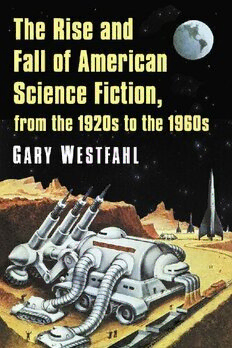
The Rise And Fall Of American Science Fiction, From The 1920s To The 1960s PDF
Preview The Rise And Fall Of American Science Fiction, From The 1920s To The 1960s
The Rise and Fall of American Science Fiction, from the 1920s to the 1960s This page intentionally left blank The Rise and Fall of American Science Fiction, from the 1920s to the 1960s G W ARY ESTFAHL McFarland & Company, Inc., Publishers Jefferson, North Carolina Also of interest and from McFarland: Bridges to Science Fiction and Fantasy: Outstanding Essays from the J. Lloyd Eaton Conferences(edited by Gregory Benford, Gary Westfahl, Howard V. Hendrix and Joseph D. Miller, 2018) The Spacesuit Film: A History, 1918–1969(by Gary Westfahl, 2012) Science Fiction and the Prediction of the Future: Essays on Foresight and Fallacy (edited by Gary Westfahl, Wong Kin Yuen and Amy Kit-sze Chen, 2011) Science Fiction and the Two Cultures: Essays on Bridging the Gap Between the Sciences and the Humanities(edited by Gary Westfahl and George Slusser, 2009) The Science of Fiction and the Fiction of Science: Collected Essays on SF Storytelling and the Gnostic Imagination(by Frank McConnell, edited by Gary Westfahl) Hugo Gernsback and the Century of Science Fiction(by Gary Westfahl, 2007) LIBRARYOFCONGRESSCATALOGUING-IN-PUBLICATIONDATA Library of Congress Cataloging-in-Publication Data Names: Westfahl, Gary, author. Title: The rise and fall of American science fiction, from the 1920s to the 1960s / Gary Westfahl. Description: Jefferson, North Carolina : McFarland & Company, Inc., Publishers, 2019. | Includes bibliographical references and index. Identifiers: LCCN 2019035920 | ISBN 9781476674940 (paperback) ♾ ISBN 9781476638515 (ebook) Subjects: LCSH: Science fiction, American—History and criticism. | American fiction—20th century—History and criticism. Classification: LCC PS374.S35 W435 2019 | DDC 813/.087620905—dc23 LC record available at https://lccn.loc.gov/2019035920 BRITISHLIBRARYCATALOGUINGDATAAREAVAILABLE ISBN (print) 978-1-4766-7494-0 ISBN (ebook) 978-1-4766-3851-5 © 2019 Gary Westfahl. All rights reserved No part of this book may be reproduced or transmitted in any form or by any means, electronic or mechanical, including photocopying or recording, or by any information storage and retrieval system, without permission in writing from the publisher. Front cover illustration © 2019 Wood River Gallery Printed in the United States of America McFarland & Company, Inc., Publishers Box 611, Jefferson, North Carolina 28640 www.mcfarlandpub.com To Mark R. Kelly—a friend, a supportive editor, and one of this business’s genuine good guys This page intentionally left blank Table of Contents Acknowledgments ix Introduction 1 Part I. The 1920s and Thereafter 1. The Emergence of American Science Fiction and Its Impact on the World 7 2. August 1928: Science Fiction’s Second Birthday 21 3. Artists in Wonderland: Towards a True History of Science Fiction Art 39 Part II. The 1930s and Thereafter 4. Pulp Science Fiction: A Student’s Guide 61 5. Beyond Logic and Literacy: The Strange Case of Space Opera 77 6. Five Ways to Conquer the Universe: The Forms of Space Opera 85 Part III. The 1940s and Thereafter 7. The Tall Dark Stranger and the Boy Next Door: A. E. van Vogt and Robert A. Heinlein 99 8. The Three Golden Ages of Science Fiction 111 9. Assemblers of Infinity: The Early History of Science Fiction Anthologies 124 Part IV. The 1950s and Thereafter 10. Invasion of the Saucer Men: How the Universe of Science Fiction Expanded in the 1950s 153 vii viii Table of Contents 11. Hard Science Fiction: An Overview 180 12. The “Big Three” Approaches to Juvenile Science Fiction and Why One Worked and the Others Did Not 196 Epilog. The 1960s and Thereafter 13. After Things Fell Apart: The Fragmentation of Science Fiction in the 1960s and 1970s 211 14. Science Fiction Today: The Triumph of the Marketplace 233 Conclusion 247 Chapter Notes 251 Bibliography 268 Index 277 Acknowledgments I should begin by thanking the individuals who were responsible for originally commissioning, and/or publishing, early versions of some chapters in this book, with the details listed below: Gerry Canavan, Donald M. Hassler, Edward James, Rob Latham, Eric Carl Link, Farah Mendlesohn, Andy Sawyer, Lars Schmeink, David Seed, the late George Slusser, and Peter Wright. Others who made no direct contributions to this book’s contents, but have long been helpful to my research and writing, should be mentioned as well: Gregory Benford, George Butler, Marika Christofides, John Clute, Arthur B. Evans, Mark R. Kelly, David Langford, Maria Mendoza, Janet Moores, David Pringle, and Willis Regier. Finally, I thank the editors and other employees of McFar- land, especially David Alff, Dylan Lightfoot, and Lisa Camp for their assis- tance in getting this book published, and, as always, my wife Lynne, children Allison Westfahl Kong and Jeremy Westfahl, son- in-law Steven Kong, and grandchildren Serena Kong and Derek Kong for their continuing support and encouragement. A previous version of “The Emergence of American Science Fiction and Its Impact on the World,” as “The Mightiest Machine: The Development of American Science Fiction from the 1920s to the 1960s,” appeared in The Cam- bridge Companion to American Science Fiction, edited by Eric Carl Link and Gerry Canavan (Cambridge: Cambridge University Press, 2015), 17–30. A previous version of “Artists in Wonderland: Towards a True History of Science Fiction Art” appeared in Unearthly Visions: Approaches to Science Fiction and Fantasy Art, edited by Gary Westfahl, George Slusser, and Kath- leen Church Plummer (Westport, CT: Greenwood Press, 2002), 19–38. A previous version of “Pulp Science Fiction: A Student’s Guide,” as “Teaching Pulp Science Fiction,” appeared in Teaching Science Fiction, edited by Andy Sawyer and Peter Wright (London: Palgrave Macmillan, 2011), 86–101. A previous version of “Beyond Logic and Literacy: The Strange Case of Space Opera” appeared in Extrapolation35:3 (Fall 1994), 176–185. ix
